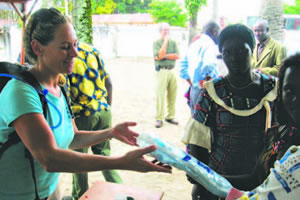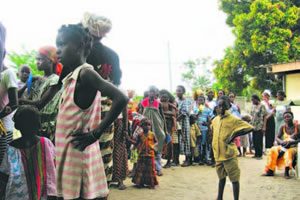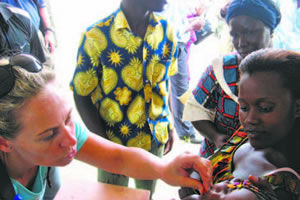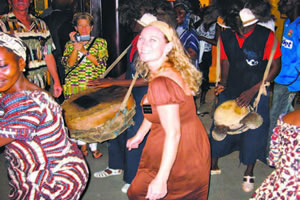Into Africa

a child waits for his vaccine
Jakki Nelson of Kapaa Rotary ventures to strife-torn Ivory Coast to help dispense thousands of polio vaccines, carrying on a tradition of service she learned from her late father
Following the example set by her father, Jakki Nelson of Kapa’a Rotary traveled to strife-torn Ivory Coast to dispense life-saving polio vaccines
It’s not every person who can say one of their favorite trips of all time was immunizing children on the African continent.
But Kapa’a Rotarian Jakki Nelson is not your average, well, Jakki. Nelson, general manager of Olympic Café, as well as the chef, beverage and product coordinator for Taste of Hawaii for the past four years, caught her travel bug early in life.
She also got a taste for helping others at an early age, thanks to her father.
“My dad was a Rotarian back in the day when it was only for men,” Nelson says. “It’s like 50-50 now, but women run the show.”
They do indeed.

It was hard work, but also fun. Photos courtesy Jakki Nelson
As international chairwoman for Kapa’a Rotary, Nelson has helped outreach efforts across the globe in the name of charity – everything from escorting visiting Japanese students around the island to giving mosquito netting and vitamin A supplements to West African children.
For those who aren’t familiar with the Rotary Club of Kapa’a, its primary community-service focus has been on Kaua’i’s youth, providing scholarships for college-bound high school seniors as well as helping develop future leaders by lending a hand to the Leadership Kaua’i program and Hale Ho Amalu.
It’s also meant donating time and money to keiki-friendly groups, including Kaua’i’s Boys and Girls Club.
But for Nelson, going farther than the Garden Isle was just a matter of time.

these keiki were among thousands who received vaccines
At the tender age of 3 months, Nelson and her family moved to Naples, Italy, where she got a taste for living abroad. Not quite a military brat (she reserves that title for those who live on base), Nelson mostly remembers the first years of her life taking motorcycle rides with her father, long drives in his Fiat convertible, riding water taxis in Venice and playing hide and seek in the ruins of Rome. Those memories are particularly dear to Nelson’s heart, as her father, Jack Henry Nelson, a Navy officer and dentist, died of cancer at the age of 53.
“He did Doctors Without Borders,” Nelson says of her father, whose volunteer work included performing operations on children with cleft palates.
And especially since his death, Jakki (named after her father) has been trying to do him proud.

Jakki Nelson at home on kaua‘i. amanda c. Gregg photo
“Dad was very into being a Rotarian,” Nelson says. “He was president of his club.”
He also was a Paul Harris fellow, named after Paul P. Harris, founder of Rotary International and the world’s first service club, which was started in Chicago in 1905. In similar form, Nelson’s father left a dental scholarship in his name in Mesquite, Texas.
“They still have that scholarship,” she says. “They award it every year.”
The Nelson family returned “stateside” and lived in Texas most of her life, where her father would take her to Rotary meetings and projects such as painting homeless shelters, serving holiday meals and park cleanups. Occasionally, if there was a speaker he wanted her to hear, he’d let her miss school.
“That was back in the day when you could miss school and still go up a grade,” Nelson says. “He would pull me out of school if someone was speaking he thought I would be interested in, and whenever we would travel he would look for and point out Rotary signs.”

Nelson dispenses mosquito netting
So it was right up Nelson’s alley when the Rotary Club announced a trip to Côte d’Ivoire (Ivory Coast) to help put a dent in polio.
Nelson was the only Kaua’i representative on that trip, for which former California Rotary district Gov. Brad Howard organized to purchase some 30,000 polio vaccines.
“I wanted to do the West Africa project because polio is so close to being eradicated, and there are not as many of these trips anymore,” Nelson says, noting the reason for that is the positive effect the Rotary trips have had in helping eradicate the disease. “My Uncle Terry is a polio survivor, and I wanted to do it for him also. He still has trouble walking with one shorter leg, but was lucky to live.”
Nelson, who raised part of the $4,500 it cost to take the trip herself (the rest she paid out of pocket), says while in Africa she had her father on her mind.
“I was thinking, ‘Dad would be proud of me,” she says. “‘Service above self,’ that’s our motto. Dad taught me all about that.”

Ivory Coast residents were anxious to receive polio vaccine
Though the trip was a tad dangerous (the dueling prime minister and president, each creating his own policies and collecting separate taxes meant the group needed its own security forces), Nelson says the trip was one of the best of her entire life.
After giving out thousands of polio vaccines, which are taken orally and don’t require needles, the group eventually ran out.
“We ran out of the vaccine after a couple hours,” Nelson says, noting the spirits of the people were still happy. “They still put on a welcome party for us.”
The most memorable part? When grateful children sang to her.
“A young girl took my hand,” she recalls, “and I was assuming she was going to show me where she lived, but she was a teacher in this school where she had all these children between 5 and 8 years old, and they sang us a song.”

Dispensing a vitamin A supplement to a child
Nelson says the reason the Rotary has been focused on polio is because other organizations had abandoned the effort. However, since mid-2009, polio has re-infected 11 countries across West Africa, claiming many lives and leaving hundreds of children crippled or paralyzed for life, according to Rotary International.
As soon as another trip is decided, Nelson wants to go.
“I will go on as many trips as I can afford,” she says. “That’s the biggest push, ending polio worldwide.”
The challenge is hardest in war-torn countries, with an additional challenge being Muslim countries, as it’s customary to prevent other men from entering households.
“So it’s got be women going,” she says, adding that some religions also are opposed to vaccinations in general.
One of the plusses to “selling” the idea of the vaccine is the fact that it’s taken orally.

When the work was done, the fun really began. Photos courtesy Jakki Nelson
“You squeeze it into the baby’s mouth and it’s a one-time deal – super easy to administer.”
The relief efforts don’t end with polio. Kapa’a Rotary (and other on-island Rotaries) sent cash donations to Japan following its recent earthquake and tsunami. That money goes toward everything from inflatable dwellings to food and water purification tables.
But this week, the experience will be a little less in survival mode for Japanese students from the Rotary’s sister city, Otsuka, whom Nelson will be taking around the island. It should be fun for the students, as Nelson is an avid canoe paddler, hiker and party thrower.
First up?
“Ziplining,” Nelson says.



